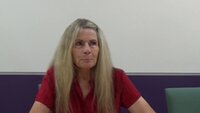| Title |
Simone, Cindy OH19_044 |
| Creator |
Weber State University, Stewart Library: Oral History Program. |
| Contributors |
Simone, Cindy, Interviewee; Singh, Sarah, Interviewer; Dove, Alyssa, Video Technician |
| Description |
The Beyond Suffrage Project was initiated to examine the impact women have had on northern Utah. Weber State University explored and documented women past and present who have influenced the history of the community, the development of education, and are bringing the area forward for the next generation. The project looked at how the 19th Amendment gave women a voice and representation, and was the catalyst for the way women became involved in the progress of the local area. The project examines the 50 years (1870-1920) before the amendment, the decades to follow and how women are making history today. |
| Abstract |
The following is an oral history interview with Cindy Simone, conducted on August 6, 2019, by Sarah Singh. Cindy discusses her life, her memories, and the impact of the 19th Amendment. Alyssa Dove, the video technician, is also present during this interview.; The following is a video clip of an oral history interview with Cindy Simone, conducted on August 6, 2019, by Sarah Singh. In this video clip, Cindy discusses her experience with adopting her son. Cindy was the first female to adopt a non-biological child in the state of Utah. |
| Image Captions |
Cindy Simone Circa 2010; Cindy Simone 6 August 2019; Cindy Simone discussing her experience of being the first female to adopt a non-biological child in the state of Utah. |
| Subject |
Voting--United States; Women--suffrage; Women--Rights of women; Adoption; Business; Bartending; Nightclubs |
| Keywords |
Adoption; Female Voting; 19th Amendment |
| Digital Publisher |
Stewart Library, Weber State University, Ogden, Utah, United States of America |
| Date |
2019 |
| Date Digital |
2019 |
| Temporal Coverage |
1949; 1950; 1951; 1952; 1953; 1954; 1955; 1956; 1957; 1958; 1959; 1960; 1961; 1962; 1963; 1964; 1965; 1966; 1967; 1968; 1969; 1970; 1971; 1972; 1973; 1974; 1975; 1976; 1977; 1978; 1979; 1980; 1981; 1982; 1983; 1984; 1985; 1986; 1987; 1988; 1989; 1990; 1991; 1992; 1993; 1994; 1995; 1996; 1997; 1998; 1999; 2000; 2001; 2002; 2003; 2004; 2005; 2006; 2007; 2008; 2009; 2010; 2011; 2012; 2013; 2014; 2015; 2016; 2017; 2018; 2019 |
| Medium |
oral histories (literary genre) |
| Spatial Coverage |
Ogden, Weber County, Utah, United States, http://sws.geonames.org/11788968, 41.22809, -111.96766 |
| Type |
Text; Image/StillImage; Image/MovingImage |
| Access Extent |
39 page PDF; Video clip is an mp4 file, 301 MB |
| Conversion Specifications |
Filmed using a Sony HDR-CX430V digital video camera. Sound was recorded with a Sony ECM-AW3(T) bluetooth microphone. Transcribed using Express Scribe Transcription Software Pro 6.10 Copyright NCH Software. |
| Language |
eng |
| Rights |
Materials may be used for non-profit and educational purposes, please credit University Archives; Weber State University |
| Source |
Simone, Cindy OH19_044 Weber State Archives |
| Format |
application/pdf; video/mp4 |
| ARK |
ark:/87278/s6n97b37 |
| Setname |
wsu_bs_oh |
| ID |
105454 |
| Reference URL |
https://digital.weber.edu/ark:/87278/s6n97b37 |
| Title |
Simone, Cindy OH19_044 |
| Creator |
Weber State University, Stewart Library: Oral History Program. |
| Contributors |
Simone, Cindy, Interviewee; Singh, Sarah, Interviewer; Dove, Alyssa, Video Technician |
| Description |
The Beyond Suffrage Project was initiated to examine the impact women have had on northern Utah. Weber State University explored and documented women past and present who have influenced the history of the community, the development of education, and are bringing the area forward for the next generation. The project looked at how the 19th Amendment gave women a voice and representation, and was the catalyst for the way women became involved in the progress of the local area. The project examines the 50 years (1870-1920) before the amendment, the decades to follow and how women are making history today. |
| Abstract |
The following is an oral history interview with Cindy Simone, conducted on August 6, 2019, by Sarah Singh. Cindy discusses her life, her memories, and the impact of the 19th Amendment. Alyssa Dove, the video technician, is also present during this interview. |
| Image Captions |
Cindy Simone Circa 2010; Cindy Simone 6 August 2019 |
| Subject |
Voting--United States; Women--suffrage; Women--Rights of women; Adoption; Business; Bartending; Nightclubs |
| Keywords |
Adoption; Female Voting; 19th Amendment |
| Digital Publisher |
Stewart Library, Weber State University, Ogden, Utah, United States of America |
| Date Digital |
2019 |
| Temporal Coverage |
1949; 1950; 1951; 1952; 1953; 1954; 1955; 1956; 1957; 1958; 1959; 1960; 1961; 1962; 1963; 1964; 1965; 1966; 1967; 1968; 1969; 1970; 1971; 1972; 1973; 1974; 1975; 1976; 1977; 1978; 1979; 1980; 1981; 1982; 1983; 1984; 1985; 1986; 1987; 1988; 1989; 1990; 1991; 1992; 1993; 1994; 1995; 1996; 1997; 1998; 1999; 2000; 2001; 2002; 2003; 2004; 2005; 2006; 2007; 2008; 2009; 2010; 2011; 2012; 2013; 2014; 2015; 2016; 2017; 2018; 2019 |
| Medium |
oral histories (literary genre) |
| Spatial Coverage |
Ogden, Weber County, Utah, United States, http://sws.geonames.org/11788968, 41.22809, -111.96766 |
| Type |
Text; Image/StillImage |
| Access Extent |
39 page PDF |
| Language |
eng |
| Rights |
Materials may be used for non-profit and educational purposes, please credit University Archives; Weber State University |
| Source |
Simone, Cindy OH19_044 Weber State Archives |
| Format |
application/pdf |
| Setname |
wsu_bs_oh |
| ID |
105597 |
| Reference URL |
https://digital.weber.edu/ark:/87278/s6n97b37/105597 |





